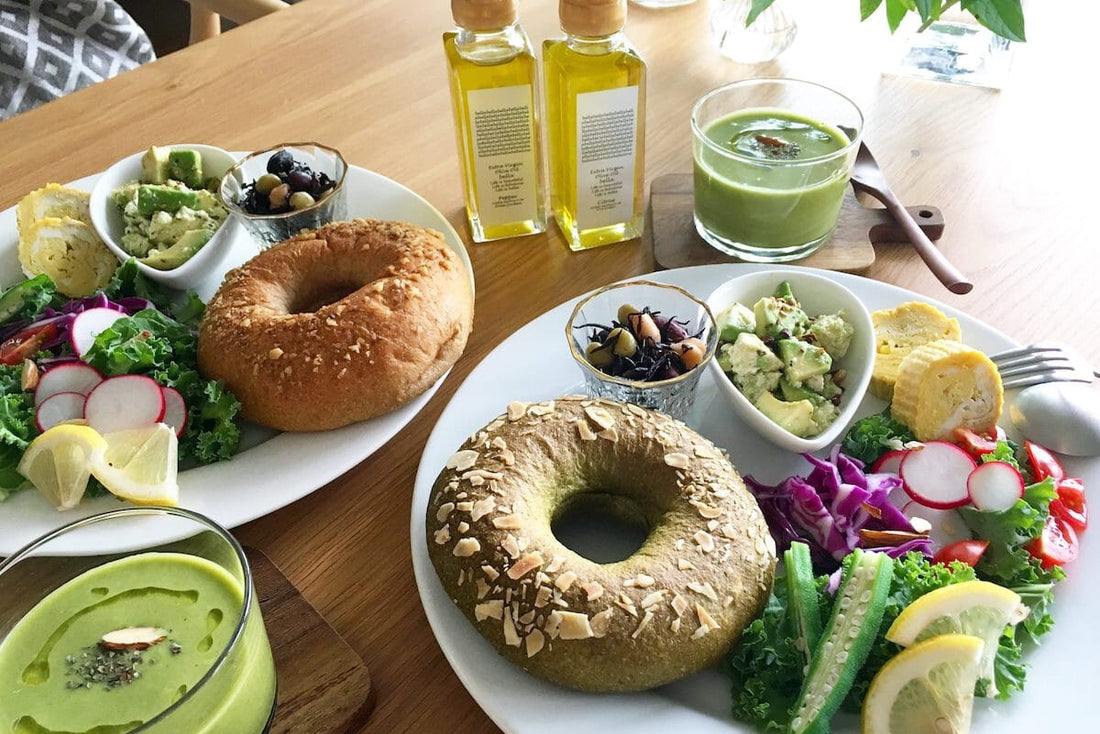
The matcha used is d:matcha's specialty matcha.
(Kawatani) Hello!
Today, we had the honor of welcoming President Tanaka of d:matcha, the company that provides the matcha for Fusubon's matcha products. Mr. Tanaka, thank you for always providing us with delicious matcha. Thank you for taking the time to see us today despite your busy schedule.
(Tanaka) Thank you very much!
(Kawatani) I met Mr. Tanaka through a mutual acquaintance. I was introduced to him just before he left to study abroad, so it took quite a while for us to meet (laughs). I had heard that the shop specialized in matcha and other teas, so I was really looking forward to meeting him.
Today, I would like to ask you mainly about how you started d:matcha and what makes d:matcha different from other matcha brands. First of all, please tell us what led you to study at the Faculty of Agriculture.
What led you to study at the Faculty of Agriculture?
(Tanaka) I had always wanted to work in a job that would improve people's health. When I was in high school, I happened to pick up a book in the library called "Japan's Self-Sufficiency Rate of 40%" and felt a strong sense of crisis about the situation in which the food we eat is not being produced domestically. From that point on, I wanted to work in a job that would help people become healthier through Japanese food, and so I decided to aspire to the Faculty of Agriculture.

(Kawatani) Thank you. I really admire the fact that you have been thinking about contributing to society since you were in high school. This is quite different from me, who just happened to choose the architecture department because my family was in the construction business and I liked physics and mathematics (laughs).
Please tell us again about the background to the launch of d-matcha.
(Tanaka) Ever since I was enrolled in the Faculty of Agriculture at university, I had been thinking that in the future I wanted to take Japanese agriculture to the world stage.
During my agricultural training, I visited farmers who sell Kyoto vegetables as well as farmers in other regions, and realized the importance of branding and having my own sales channels.

(Kawatani) It must have been great to have the opportunity to interact with farmers who deal in high-value-added vegetables during your university internship. What did you do after graduating from university?
(Tanaka) After graduating, I didn’t have any concrete ideas about starting a business in the agricultural sector, so I worked for a foreign consulting firm and as president of a US donut chain that was trying to revitalize itself, and then went to study in the US.
(Kawatani) I see. With so many options available, why did you decide to focus on tea and start a business?
Why did you focus on tea?
(Tanaka) The reason we chose "tea" as a product to sell was because
① Long-term global growth in demand
② It is good for your health
3) It can be used not only for drinks but also for sweets and food, making it versatile. 4) It has a story that is closely related to Japanese culture such as the tea ceremony.
While there is a global demand, the supply side, that is, tea leaf production, is facing a shortage of tea producers due to the aging population, and only 3% of tea in Japan is organically grown, which is in demand in overseas markets.
We believed that by handling everything from production to sales ourselves, we could meet the needs of customers around the world, so we launched d:matcha, which handles everything from production to sales.
(Kawatani) I was surprised that you had production in mind from the start, not just sales. I understand that you studied agriculture at university, but it must have been difficult to actually grow the produce. How did you get to that point?
History of cultivation
(Tanaka) My younger brother Chisei, who is in charge of production, and another staff member named Aka have been undergoing agricultural training at a farm in Wazuka Town, Kyoto Prefecture since April 2016.
As a company, we continued to search for farmland, and thanks to the kindness of the local community, we were able to gather a considerable amount of farmland.
We have been harvesting in our own fields since June. Many of the fields we rent are in harsh and difficult locations, as farmers have left areas with poor conditions.
However, since we aim to produce organic green tea, sloping land that is free from contamination by pesticides from other fields is actually convenient. Sloping land also has the advantage of being very sunny, making the tea trees less susceptible to disease.
In fact, this field is on an extremely steep slope, but we were able to harvest tea grown without pesticides.

(Kawatani) It's very interesting that steep slopes are ideal for organic farming. It's a kind of reverse thinking, but everything has a dual nature. Is working on steep slopes really difficult?
(Tanaka) The work is really hard. To get down the slope, you have to hold on to the tea plants in your hands.

(Kawatani) Please be careful when working so as not to get injured. At Fusubon, we also use organic materials for the parts that are directly exposed to pesticides, such as bran and soy flour. What made you interested in organic, Mr. Tanaka?
(Tanaka) The biggest trigger was when I studied abroad in the US and saw the market and food situation there. In Japan, there are many very high-quality ingredients even for conventional products.
However, in America, there are many non-existent products, and especially the wealthy have a strong perception that organic certification means safe ingredients.
The demand for organic food is so large that Whole Foods, an organic supermarket, has sales of 400 billion yen, and it is growing every year. Therefore, we believe that organic is a minimum requirement when exporting food to overseas markets, especially the US market.

(Kawatani) Thank you. Next, please tell us about the matcha used at Fusubon.
About the matcha used at Fusubon
(Tanaka) The matcha that we supply to Fusubon is a blend of multiple varieties to ensure a strong color and flavor and to ensure that the matcha stands out even when mixed with other ingredients in the bran bread.
Our company has its own stores and develops sweets and breads using matcha in-house, so we are skilled at blending matcha according to purpose.
(Kawatani) I would like to increase the number of d:matcha's matcha products, such as roll cakes and muffins. Recently, the environment surrounding agriculture has been changing rapidly, with the amendment of the Seed Act being passed, the US withdrawing from the TPP, and the declining birthrate and aging population.
Mr. Tanaka, who graduated from the Faculty of Agriculture, please tell us what you think about the future of agriculture in Japan.
(Tanaka) The aging of the Japanese population is a growing problem, and the problem is even more serious in the agricultural sector. We aim to make agriculture profitable and have a market in overseas markets, which will continue to grow in the future, and to make it easier for people to work. For example, there is the issue of work style reform, but in agriculture, there are generally few days off, so that is the first priority.
Secondly, rural life and urban life are very different, so I think it is necessary to create an environment that is easy to live in. In Japan, rather than just discussing systems and mechanisms, I think it would be more effective to have as many role models as possible to have a more immediate overall impact.
I would like to help as many entrepreneurs and businessmen as possible to become active in the agricultural and food fields.
(Kawatani) Thank you very much. At Fusubon, we also want to use domestic and local raw materials as much as possible to boost domestic agriculture. Thank you for today!
(Tanaka) Thank you very much!
(Kawatani) Next time, I would like to visit your farm. See you again! 
| Profile of Daiki Tanaka CEO of d:matcha Graduated from the Faculty of Agriculture, Kyoto University. Graduated with an MBA from Babson College. Promoted to senior consultant at the Tokyo office of Booz Allen Hamilton, a US strategic consulting firm, at the youngest age in the shortest time. After serving as a director at EC Holdings, at the age of 26, he led the restructuring of Doughnut Plant Tokyo as president and CEO, achieving profitability in three terms. In June 2016, he founded D-matcha Co., Ltd. He is also a director of Shin Holdings Co., Ltd. |

